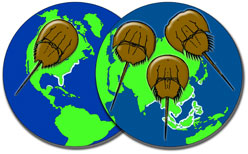International Symposium on the Science
and Conservation of Horseshoe Crabs – 2007
 |
Science helping to
|
Dowling College
Oakdale, Long Island NY
11-14 June, 2007
NEW: Conference Program
NEW: Posters
NEW: Conference Meal Plan
Purpose: To bring together an international group of interested parties for the first time
- to discuss the science and conservation of horseshoe crabs
- to formulate plans for international conservation programs engaging scientists and managers from the U.S. and other nations, and
- to document the symposium products in a published proceedings.
Where: Dowling College, Oakdale, Long Island, New York. Dowling College is conveniently located near major airports in the New York metropolitan area, and is a short distance from field sites on Long Island that offer exceptional opportunities for our international visitors to view the spectacular Spring spawning migration of horseshoe crabs.
Background: The four living species of horseshoe crabs face a set of common and growing threats to their survival, including the erosion and/or man-made alteration of essential spawning habitat, coastal pollution, and overfishing. Horseshoe crabs are "living fossils," with a more than 200 million year evolutionary history. Their blood provides a reagent, known as Limulus amebocyte lysate or LAL, that clots in the presence of minute quantities of bacterial endotoxin; the LAL test is the state-of-the-art methodology used to ensure that pharmaceuticals and surgical implants are free of contamination. Horseshoe crabs are an integral part of the food web in coastal marine ecosystems, and their eggs provide essential food for shorebirds in the Delaware Bay estuary each Spring. The commercial fishery for horseshoe crabs, which utilizes animals for bait, contributes to the economies of coastal communities.
In early 2005, a number of horseshoe crab biologists around the world began discussions about the need to have a forum in which we could meet, exchange ideas, and plan future research and conservation strategies. By Fall, 2005, a symposium Planning Committee had come together, chosen the location at Dowling College, and organized the basic structure of the four day conference to be held from June 11-14, 2007. The timeliness of this International Symposium is underscored by the World Conservation Union's (IUCN) listing of three of the four species as data deficient, species which can not be evaluated due to the lack of fundamental scientific information.